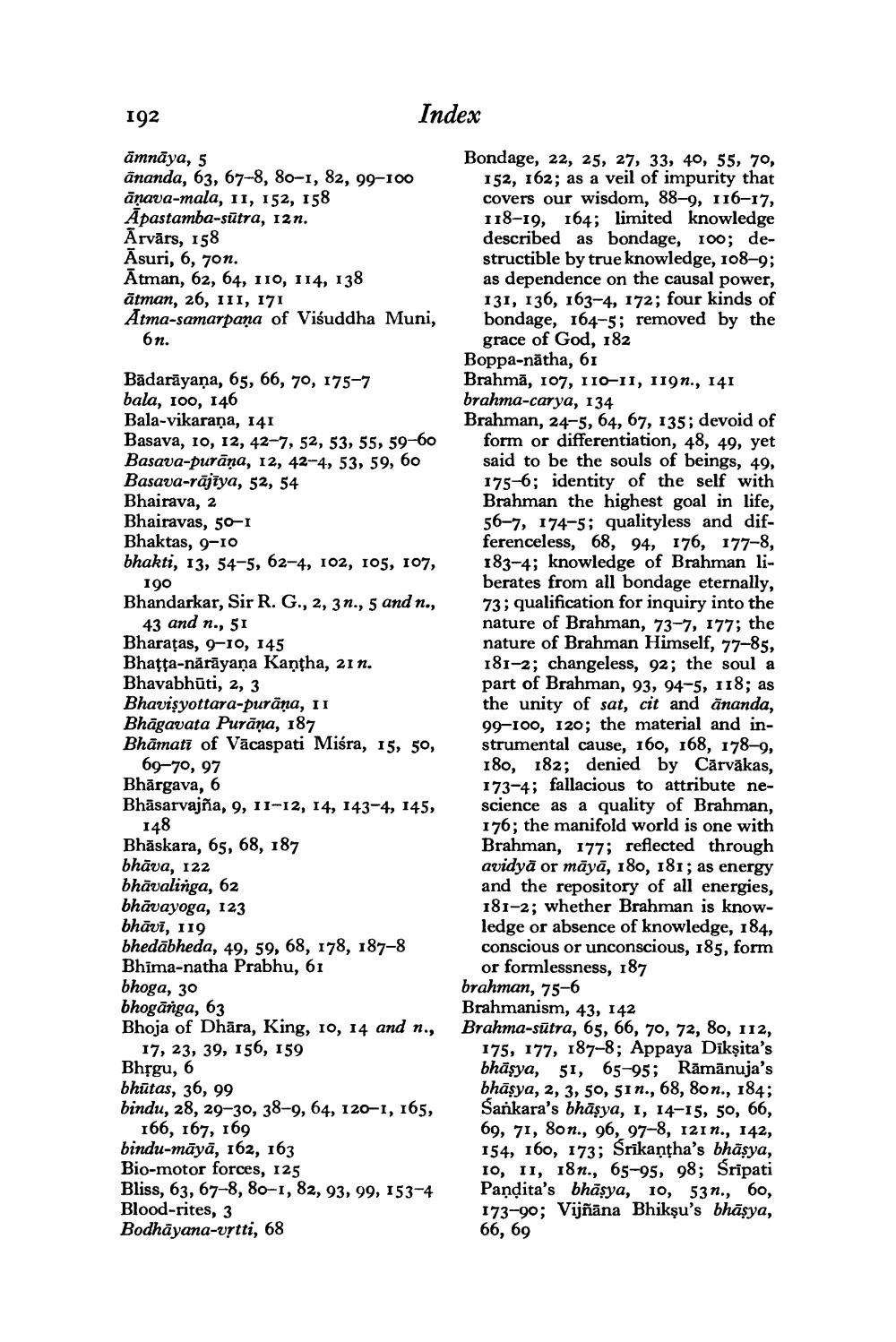Book Title: History of Indian Philosophy
Author(s): Surendranath Dasgupta
Publisher: Cambridge University Press
View full book text
________________
192
Index
22, 25, 2e of impu, 116-17
āmnāya, 5 ănamda, 63, 67-8, 8o-I, 82, 99-10 āņava-mala, 11, 152, 158 Apastamba-sūtra, 12n. Arvārs, 158 Asuri, 6, 70n. Atman, 62, 64, HO, H4, 138 atmam, 26, III, I7I Atma-samarpana of Visuddha Muni,
6n.
Bādarāyaṇa, 65, 66, 70, 175-7 bala, 100, 146 Bala-vikarana, 141 Basava, 10, 12, 42-7, 52, 53, 55, 59-60 Basava-purāna, 12, 42-4, 53, 59, 60 Basava-rājīya, 52, 54 Bhairava, 2 Bhairavas, 50-1 Bhaktas, 9-10 bhakti, 13, 54-5, 62-4, 102, 105, 107,
190 Bhandarkar, Sir R. G., 2, 3n., 5 and n.,
43 and n., 51 Bharatas, 9-10, 145 Bhatta-nārāyana Kantha, 21n. Bhavabhūti, 2, 3 Bhavişyottara-purāņa, II Bhāgavata Purāna, 187 Bhāmatī of Vācaspati Miśra, 15, 50,
69–70, 97 Bhārgava, 6 Bhāsarvajña, 9, 11-12, 14, 143-4, 145,
148 Bhāskara, 65, 68, 187 bhāva, 122 bhāvalinga, 62 bhāvayoga, 123 bhāvī, 119 bhedābheda, 49, 59, 68, 178, 187-8 Bhīma-natha Prabhu, 61 bhoga, 30 bhogānga, 63 Bhoja of Dhāra, King, 10, 14 and n.,
17, 23, 39, 156, 159 Bhrgu, 6 bhūtas, 36, 99 bindu, 28, 29-30, 38-9, 64, 120–1, 165,
166, 167, 169 bindu-māyā, 162, 163 Bio-motor forces, 125 Bliss, 63, 67-8, 80-1, 82, 93, 99, 153-4 Blood-rites, 3 Bodhāyana-vrtti, 68
Bondage, 22, 25, 27, 33, 40, 55, 70,
152, 162; as a veil of impurity that covers our wisdom, 88-9, 116–17, 118-19, 164; limited knowledge described as bondage, 100; destructible by true knowledge, 108-9; as dependence on the causal power, 131, 136, 163-4, 172; four kinds of bondage, 164-5; removed by the
grace of God, 182 Boppa-nătha, 61 Brahmā, 107, 110-11, 119n., 141 brahma-carya, 134 Brahman, 24-5, 64, 67, 135; devoid of
form or differentiation, 48, 49, yet said to be the souls of beings, 49, 175-6; identity of the self with Brahman the highest goal in life, 56–7, 174-5; qualityless and differenceless, 68, 94, 176, 177-8, 183-4; knowledge of Brahman liberates from all bondage eternally, 73; qualification for inquiry into the nature of Brahman, 73-7, 177; the nature of Brahman Himself, 77-85, 181-2; changeless, 92; the soul a part of Brahman, 93, 94-5, 118; as the unity of sat, cit and ananda, 99-100, 120; the material and instrumental cause, 160, 168, 178-9, 180, 182; denied by Cārvākas, 173-4; fallacious to attribute nescience as a quality of Brahman, 176; the manifold world is one with Brahman, 177; reflected through avidyā or māyā, 180, 181; as energy and the repository of all energies, 181-2; whether Brahman is knowledge or absence of knowledge, 184, conscious or unconscious, 185, form
or formlessness, 187 brahman, 75-6 Brahmanism, 43, 142 Brahma-sūtra, 65, 66, 70, 72, 80, 112,
175, 177, 187-8; Appaya Dīkşita's bhāşya, 51, 65-95; Rāmānuja's bhāsya, 2, 3, 50, 51n., 68, 80n., 184; Sankara's bhāşya, 1, 14-15, 50, 66, 69, 71, 80n., 96, 97-8, 121n., 142, 154, 160, 173; Śrīkaņțha's bhäşya, IO, II, 18n., 65-95, 98; Sripati Pandita's bhāsya, 10, 53n., 60, 173-90; Vijñāna Bhikşu's bhāsya, 66, 69
40

Page Navigation
1 ... 2502 2503 2504 2505 2506 2507 2508 2509 2510 2511 2512 2513 2514 2515 2516 2517
